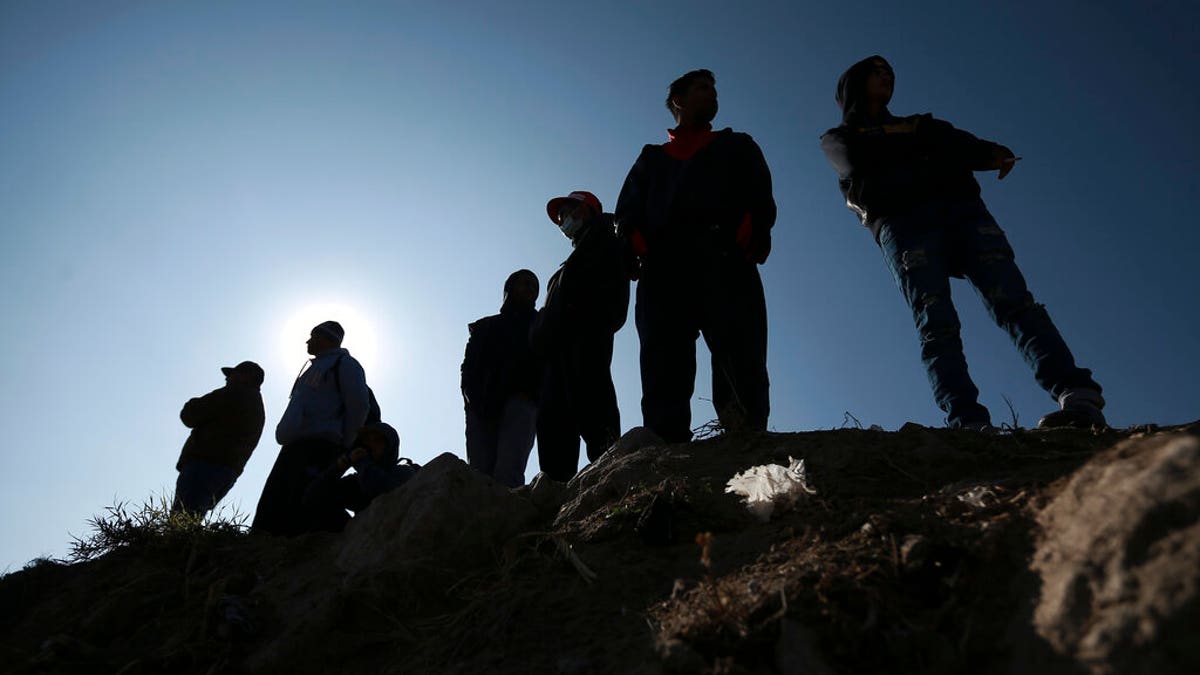GOP lawmakers make case to impeach Mayorkas
Fox News’ Bill Melugin reports on House Republicans torching Homeland Security Secretary Mayorkas over his handling of the border crisis as fentanyl deaths reach all-time highs.
The Biden administration is setting up migrant processing centers to screen and potentially green-light migrants to come to the U.S. using a variety of legal pathways, while also stiffening penalties for illegal entry at the southern border -- as part of a strategy to discourage migrants from entering the U.S. illegally after the Title 42 public health order expires next month.
Secretary of State Antony Blinken and DHS Secretary Alejandro Mayorkas announced a series of moves to broaden access to legal refugee, parole and employment pathways while also deterring illegal entry at the border. It comes ahead of the expiration of Title 42 – a COVID-era order that allows for the rapid expulsion of migrants at the border. That expiration of May 11 is expected to be followed by a significant surge of migration at the border.
‘This is a hemispheric challenge that demands hemispheric solutions," Mayorkas said at a press conference. "Working with our neighbors in the region, we can and will reduce the number of migrants who reach our southern border."
The centerpiece of the preparatory measures is the establishment of processing centers in countries across the Hemisphere including Guatemala and Colombia where migrants can be screened to see if they are eligible for refugee status, a variety of humanitarian parole programs and even employment access. The processing centers will be run by "international organization partners," officials told reporters on Thursday ahead of the formal announcement.

Migrants stand near the U.S.-Mexico border in Ciudad Juarez, Mexico, Monday, Dec. 19, 2022. ((AP Photo/Christian Chavez))
The Biden administration has expanded the refugee ceiling to 125,000 from the 15,000 a year under the Trump administration, but admissions have not come close to meeting that cap even as migrant numbers at the border have skyrocketed. A senior administration official said that while the criteria for refugee resettlement have not changed, the government expects to identify more eligible individuals and dramatically increase admissions under the program.
Additionally, the administration has parole programs for family reunification and for certain nationalities -- including Venezuelans, Nicaraguans, Cubans and Haitians – for which migrants could be eligible. DHS will also announce an expansion of eligibility for the family reunification parole program to cover Guatemala, El Salvador, Colombia and Honduras.
Employment pathways could include temporary worker visas, including temporary seasonal and agricultural visas, although officials did not say specifically which pathways would be available. DHS is also expected to announce an expansion of appointments under the CBP One app -- where the overwhelming majority of those who have secured an appointment have been approved --
The move is part of the Biden administration’s approach of increasing legal pathways as well as taking a regional approach to migration outlined in the June 2021 Los Angeles Declaration on Migration and Protection -- in which a number of countries, including the U.S., made migration-related commitments. Officials said Spain and Canada are among the countries who have "indicated" that they will accept referrals from the center.
"It's an approach focused on making migration more safe, orderly and humane while advancing the interests of the American people," Blinken said.
SUSAN RICE DEPARTURE MARKS EXIT OF HIGH-PROFILE MODERATE ON IMMIGRATION
While officials expect the programs to reduce pressure on the southern border, it will likely draw criticism from Republicans and immigration hawks who have accused the administration of adopting a policy of "maximum migration" and of running a "concierge service" to bring in migrants who would otherwise enter illegally.
BIDEN ADMIN PAUSES KEY ASYLUM SHAKEUP AHEAD OF TITLE 42'S EXPIRATION NEXT MONTH
The moves are combined with what the administration is presenting as a tougher stance on those who enter the U.S. illegally. The administration will soon implement a "rebuttable presumption of ineligibility" for asylum -- which in theory would make anyone ineligible for asylum if they have entered the U.S. illegally and failed to claim asylum at a previous country through which they traveled. However, Mayorkas has also stressed that the ineligible is rebuttable and has a number of exemptions in place.
Separately, officials have said that, with Title 42 ending, regular punishments for illegal entry under Title 8 will be used at a greater rate once the order drop. Those include the use of expedited removal to quickly deport migrants to Mexico within a matter of days, potential criminal penalties and also a five-year bar on re-entry and a presumption of asylum ineligibility. Authorities are also launching a 60-day surge campaign with Panama and Colombia to disrupt criminal networks in the Darien Gap.
The administration is also increasing deportation flights, including to Cuba. Flights to the communist nation had stopped due to COVID-19. Officials said removal flights will triple for some countries.
Mayorkas said, however, that officials still expect the number of migrants coming to the U.S. to surge post-May 11.
CLICK HERE TO GET THE FOX NEWS APP
"Notwithstanding those preparations, we do expect that encounters at or southern border will increase as smugglers are seeking to take advantage of this change and already hard at work spreading misinformation that the border will be open after that," he said.
Officials meanwhile, redoubled calls for Congress to work to fix what the administration says is a broken immigration system and to provide more funding. President Biden released a framework on Day One for sweeping immigration reform -- but it was rejected by Republicans who ruled out the inclusion of a mass amnesty for millions of illegal immigrants already in the U.S.
Mayorkas said that DHS is reprogramming funding from other parts of DHS, but said that it was "only a fraction" of what was needed, as he also called on Congress to act and provide more funding.















































